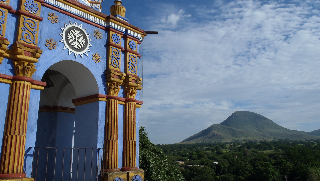Editor’s Note: This article was originally published in the Winter 2012 edition of CLLAS Notes, the newsletter of the Center for Latino/a and Latin American Studies.
by Iván Sandoval

This project explores how immigration affects land conflicts in Santa Ana Zegache, located in the central valleys of Oaxaca, México. Santa Ana Zegache, like many other communities in the Mexican countryside, is a divided community. Its divisions are reflected in two main realms: political parties and land issues. At this stage of the project I am focusing on the latter, although it should be noted both of these realms are deeply intertwined.
Land conflict is not a new phenomenon in Santa Ana Zegache. In fact, archival material shows that the conflict between “agraristas” (or the people who defend the “communal” land-holding system also known as “ejido”) and “propietarios” (those who support a version of private property) has been present in the community at least since the 1940s. This conflict has taken many different forms, however, and in the last two decades the divide between the “ejidatarios” and the ”propietarios” became almost symmetrical with the division between Santañeros who support either the Partido Revolucionario Institucional (PRI) and those who support the Partido de la Revolución Democrática (PRD). This division has split families and friendships, and, because of that, it has created new networks that have been transplanted to Santa Ana’s immigrant community in Oregon.
My project will highlight how land conflicts have been transformed by immigration and how Santa Ana’s immigrant community in Oregon has also been transformed by the increased intensity of local land conflicts. Studying land conflict in transborder communities can help us to understand how immigration modifies people’s political attitudes, and it can also shed some light on how immigrant communities retain connections with their communities of origin by emphasizing a particular relation to land and agriculture in a familial and communal setting. ■
—Iván Sandoval is a second year master’s student in the Department of Anthropology. Iván received his licenciatura in anthropology from the Universidad de las Americas-Puebla, in Mexico, and he also received a master’s in the philosophy of sciences from the London School of Economics.
